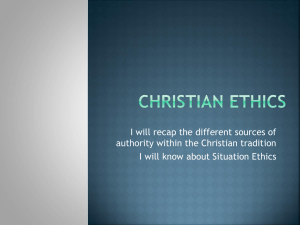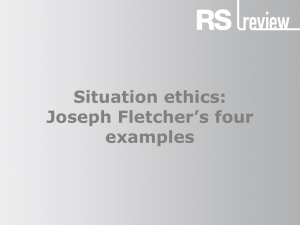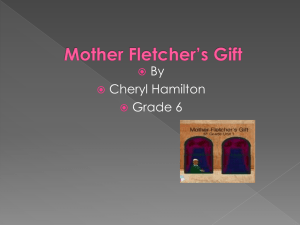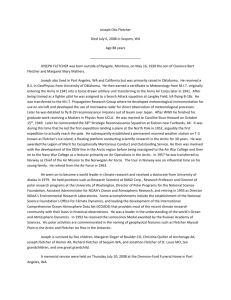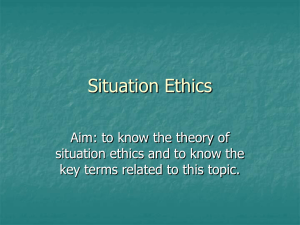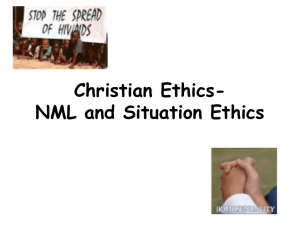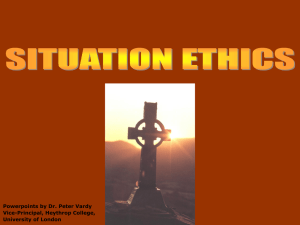Aristotle - RSrevision
advertisement
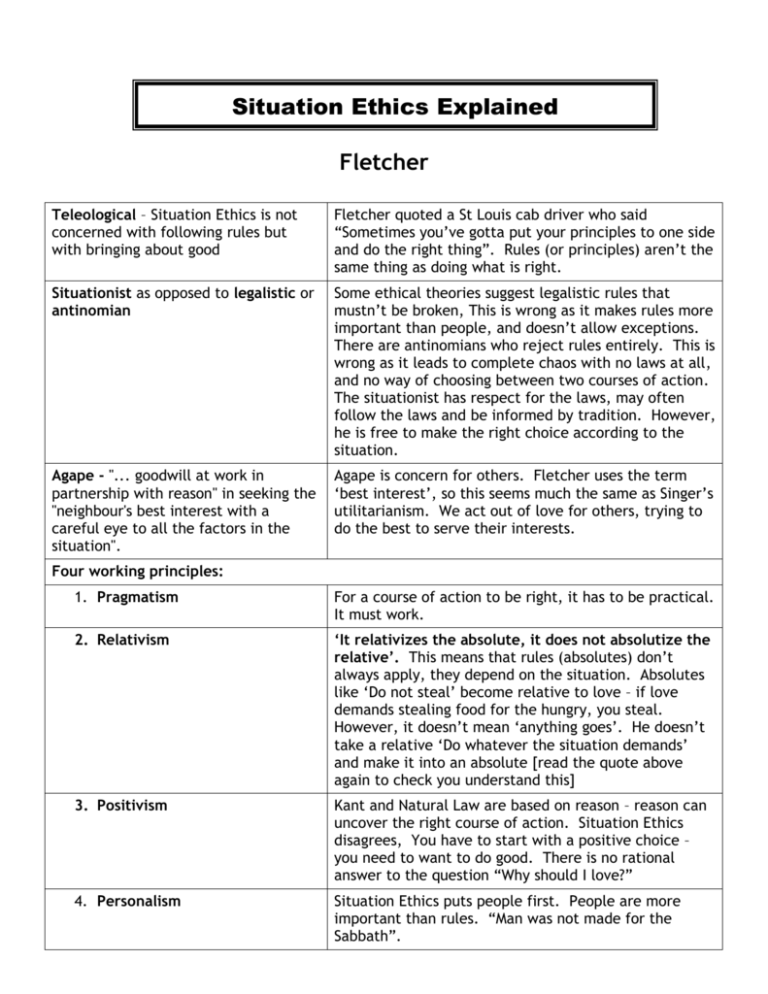
Situation Ethics Explained Fletcher Teleological – Situation Ethics is not concerned with following rules but with bringing about good Fletcher quoted a St Louis cab driver who said “Sometimes you’ve gotta put your principles to one side and do the right thing”. Rules (or principles) aren’t the same thing as doing what is right. Situationist as opposed to legalistic or antinomian Some ethical theories suggest legalistic rules that mustn’t be broken, This is wrong as it makes rules more important than people, and doesn’t allow exceptions. There are antinomians who reject rules entirely. This is wrong as it leads to complete chaos with no laws at all, and no way of choosing between two courses of action. The situationist has respect for the laws, may often follow the laws and be informed by tradition. However, he is free to make the right choice according to the situation. Agape - "... goodwill at work in partnership with reason" in seeking the "neighbour's best interest with a careful eye to all the factors in the situation". Agape is concern for others. Fletcher uses the term ‘best interest’, so this seems much the same as Singer’s utilitarianism. We act out of love for others, trying to do the best to serve their interests. Four working principles: 1. Pragmatism For a course of action to be right, it has to be practical. It must work. 2. Relativism ‘It relativizes the absolute, it does not absolutize the relative’. This means that rules (absolutes) don’t always apply, they depend on the situation. Absolutes like ‘Do not steal’ become relative to love – if love demands stealing food for the hungry, you steal. However, it doesn’t mean ‘anything goes’. He doesn’t take a relative ‘Do whatever the situation demands’ and make it into an absolute [read the quote above again to check you understand this] 3. Positivism Kant and Natural Law are based on reason – reason can uncover the right course of action. Situation Ethics disagrees, You have to start with a positive choice – you need to want to do good. There is no rational answer to the question “Why should I love?” 4. Personalism Situation Ethics puts people first. People are more important than rules. “Man was not made for the Sabbath”. Six fundamental principles: Love only is always good ‘Only one ‘thing’ is intrinsically good; namely, love: nothing else at all’ Love is intrinsically valuable, it has inherent worth. Love is good. Nothing else has intrinsic value but ‘it gains or acquires its value only because it happens to help persons (thus being good) or to hurt persons (thus being bad)’. A lie is not intrinsically wrong. It is wrong if it harms people, but may sometimes be right. ‘For the Situationist, what makes the lie right is its loving purpose; [they are] not hypnotised by some abstract law, ‘Thou shalt not lie’.’ Love is the only norm (rule) ‘The ruling norm of Christian decision is love: nothing else’ Love replaces the law. The law should only be obeyed in the interests of love, not for the law’s sake! Fletcher rejects Natural Law. He says ‘There are no [natural] universal laws held by all men everywhere at all times.’ Jesus summarized the entire law by saying ‘Love God’ and ‘Love your neighbour’. Love is the only law. The problem with this is that it allows the individual to do anything in the name of love – there are no rules to say that someone has done the wrong thing. Love and justice are the same "Love and justice are the same, for justice is love distributed, nothing else." There can be no love without justice. Consider any injustice – a child starving, a man arrested without charge etc. These are examples of a lack of love. If love was properly shared out, there would be no injustice. Love is not liking "Love wills the neighbor’s good whether we like him or not." Love is discerning and critical, not sentimental. Martin Luther King described Agape love as a ‘creative, redemptive goodwill to all men’. He said it would be nonsense to ask people to like their violent oppressors. Christian love is a non-selfish love of all people. Love justifies the means "Only the end justifies the means; nothing else," When someone said to Fletcher ‘The end doesn’t justify the means’, he said ‘Then what on earth does?’. If an action causes harm, it is wrong. If good comes of it, it is right. Fletcher says you can’t claim to be right by following a rule (like ‘Do not lie’) knowing it will cause great harm. Only the end or outcome can justify your action. Love decides there and then There are no rules about what should or shouldn’t be done – in each situation, you decide there and then what the most loving thing to do is.
